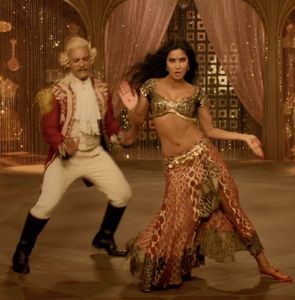In this column, I have held forth a lot on item numbers, mostly fuming against the crassness and the objectification contained in their lyrics and choreography. Lines like “I am a tandoori chicken, wash me down with alcohol...” from Fevicol Se, “Juicy lips, oh your juicy lips...” from Hoth Rasiley, and “I am buttery Chameli, I have secretly downed a peg of whiskey and come here...” [Chikni Chameli] have given me particular pain.
I mean, why is the woman describing herself as a fast food accompaniment to alcohol, to be chewed, digested and excreted the next day? Why did somebody whom the press insists on describing as a ‘Bollywood A-lister’ agree to dance to it? Why the need to wax eloquent on the juiciness of lips, while making suggestive gestures? Why the fetishising of a woman who drinks in secret? And why can she not just have her wretched peg of whiskey out in the open like a normal person?
It seems to me that item songs usually follow one of two formats: 1) the item girl throws herself at a man and he rejects her, and she pouts and slithers around him and tries to woo him while he remains impervious to her charms (Kajra Re); 2) the item girl gives the snooty, full-on high maintenance ones, while a group of men salivate around her, indulging in patently fake desperately smitten behaviour. These item songs usually end with the item girl doing something utterly predictable like going off tamely with the main man, whoever he is, or scurrying for cover with her musicians because a big fight scene is beginning, or being kidnapped, or dying cheaply while trying to save the hero/slay the villain in some sort of climactic crossfire.
And that is why I am utterly charmed by the freshness of Suraiyya from Thugs of Hindostan. She lives alone in a plush haveli/kotha, calls all the shots in this establishment (no bossy madam or greasy pimp-uncle in sight) and has absolutely no soft corner for our hero. When a band of harried freedom fighters comes to her haveli looking for a safe hiding place, she agrees to let them stay, declaring, “I do not believe in slavery. Nobody should be a slave, either of their loved ones, or of the British.” That had me on my feet and whistling faster than any shot of any Bollywood hero taking his shirt off and flashing a poorly defined, starved-looking six-pack. I mean, Wah! Wah! Good on you, Suraiyya Jaan! In the eighteenth century, you had already imbibed the insights Indian advertising and Mother’s Horlicks are discovering only today.
Of course, she is just a bit player in this strange, solemn movie. But she definitely has the best bits! The lyrics of her item song feel strong and have agency. (Good on you, Amitabh Bhattacharya.) She gets to sing some pretty sassy lines to her ‘smitten’ paramour: “I have met you, I have fed you, I have sung for you, now what else can I possibly do? Should I have your child, and pack it up, and hand it to you?”
I must confess that I thought she was going to die—and that the gaily sung line, “Suraiyya jaan degi kya... (Should Suraiyya give her life for you...)” was some sort of bitter-sweet foreshadowing of that tragic moment. But I am happy to report that I was fully wrong.
At the end of the song, instead of conspiring to conceal the identity of her suitor (Aamir Khan in a blond wig, in a whites-only club, which has issued shoot-at-sight orders against all Indian trespassers) she whips off his wig, revealing his true identity to the audience packed with goras and plunging him into dire peril, with a sweet pout and a shrug, and absolutely no remorse whatsoever.
It was truly a subversive moment in the item girl’s narrative. We should celebrate it as such.


